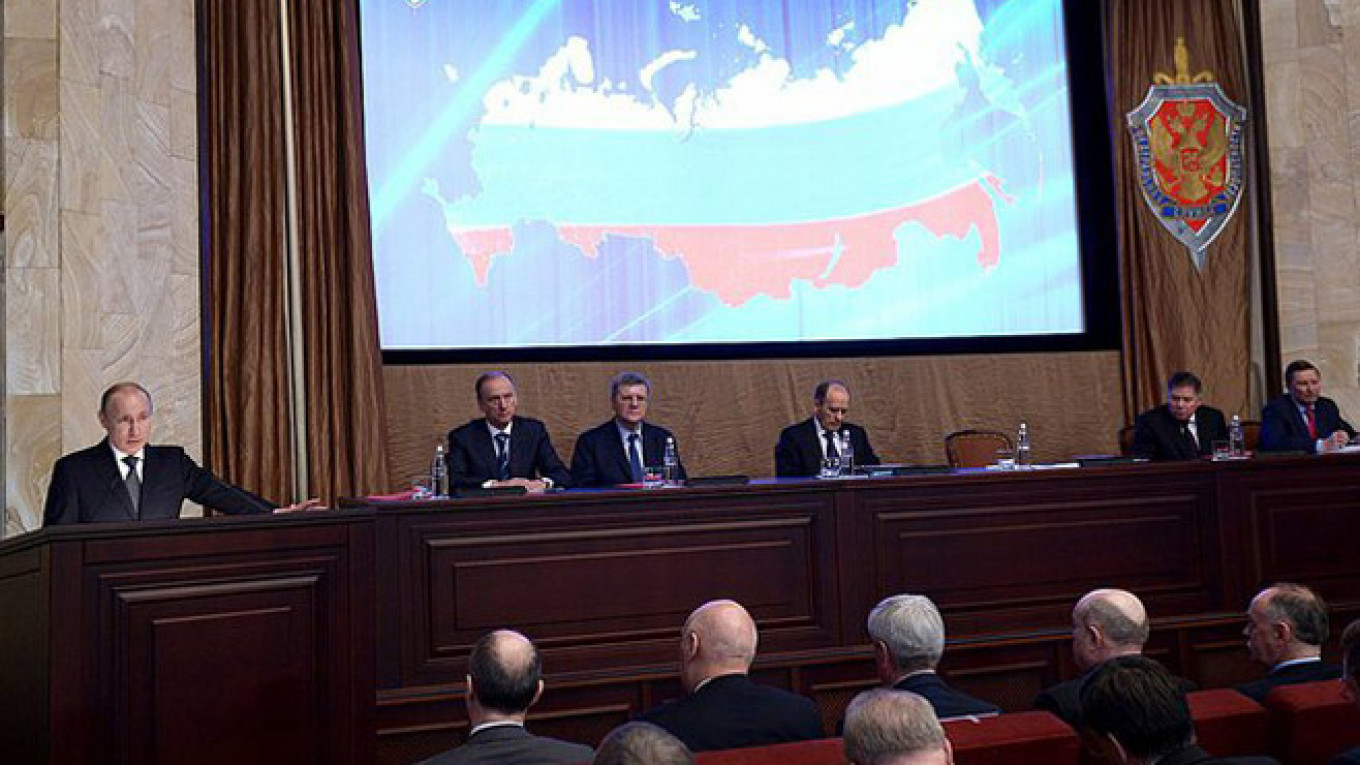Western governments will attempt to discredit and destabilize Russia, but their efforts will be futile, President Vladimir Putin told Russia's top security officials Thursday.
"We have always had and always will have a proper response to all internal and external threats to national security," Putin told senior officers of the Federal Security Service, a successor agency to the Soviet KGB, during a board meeting.
Putin, himself a previous director of the FSB, listed as external threats the expansion of NATO infrastructure to Russia's borders, the establishment of European and Asian segments of the U.S. missile defense system and the development of new weapons as part of the U.S. Prompt Global Strike program, which aims to create a conventional weapon system that can reach any target in the world within one hour.
Primary internal threats are terrorism, extremism, espionage and attempts to use public and nongovernmental organizations to discredit the Russian government and destabilize the country, the president said.
"Western special services continue their attempts at using public, nongovernmental and politicized organizations to pursue their own objectives, primarily to discredit the authorities and destabilize the internal situation in Russia. They are already planning their actions for the upcoming election campaigns of 2016-18," Putin said in his speech.
Russia will hold elections for the State Duma in 2016, which will be followed by presidential elections in 2018 in which Putin is eligible to run.
"We are ready for dialogue with the opposition and will continue our partnership with civil society in the broadest sense of the word," Putin said.
"But it is pointless entering into a discussion with those who are operating on orders from the outside in the interests of some other country rather than their own," he said.
In 2012, Russia adopted a law that labels every NGO that is engaged in loosely defined political activities and receives any financial support from abroad as a "foreign agent."? ? ?
Putin promised that the state would continue to "pay attention to nongovernmental organizations that have foreign funding sources; we will compare their stated goals with their actual activities and terminate any violations."
In addition to the "foreign agents" law, Russia has passed a series of other laws in recent years that aim to limit foreign influence on its political life. In October, the Duma passed a law limiting foreign media ownership in Russian media assets to 20 percent. The following month, Putin signed a law outlawing foreign sponsorship of Russian political organizations. ?
Overall, the counter-espionage agencies have thwarted the activities of 290 agents and 52 officers of foreign intelligence services in the past year, Putin said. ?
Putin said that terrorist activity is declining in Russia, with 2.6 times fewer terrorist attacks in 2014 than the year before. The overall number is nine times smaller than it was five years ago, he said.
He warned, however, that the FSB would have to work even harder to bring about positive change than it did last year, which was marked by a growing crisis in the Middle East and a violent conflict in Ukraine that Putin described as a civil war provoked by a "coup d'etat."
"The situation cannot remain like this forever. It will change, for the better I hope, including the situation around this country," Putin told the audience.
"However, it will not change for the better if we succumb, yield and pander to people at every step. It will only change for the better if we become stronger," he said.
Contact the author at i.nechepurenko@imedia.ru
A Message from The Moscow Times:
Dear readers,
We are facing unprecedented challenges. Russia's Prosecutor General's Office has designated The Moscow Times as an "undesirable" organization, criminalizing our work and putting our staff at risk of prosecution. This follows our earlier unjust labeling as a "foreign agent."
These actions are direct attempts to silence independent journalism in Russia. The authorities claim our work "discredits the decisions of the Russian leadership." We see things differently: we strive to provide accurate, unbiased reporting on Russia.
We, the journalists of The Moscow Times, refuse to be silenced. But to continue our work, we need your help.
Your support, no matter how small, makes a world of difference. If you can, please support us monthly starting from just $2. It's quick to set up, and every contribution makes a significant impact.
By supporting The Moscow Times, you're defending open, independent journalism in the face of repression. Thank you for standing with us.
Remind me later.


